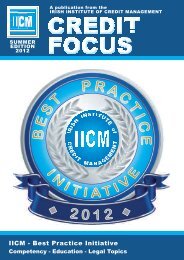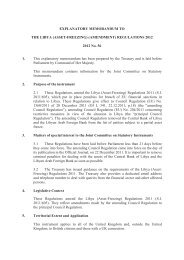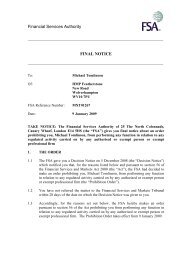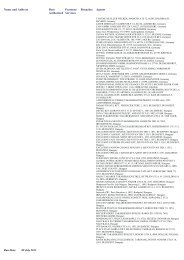FSA Annual Report 2006/07 - Better Regulation Ltd
FSA Annual Report 2006/07 - Better Regulation Ltd
FSA Annual Report 2006/07 - Better Regulation Ltd
Create successful ePaper yourself
Turn your PDF publications into a flip-book with our unique Google optimized e-Paper software.
8<br />
Chief Executive’s report<br />
<strong>FSA</strong> <strong>Annual</strong> <strong>Report</strong> <strong>2006</strong>/<strong>07</strong><br />
Chief Executive’s<br />
report<br />
Introduction<br />
For the last several years we have<br />
set our strategy and arranged our<br />
priorities to achieve our three aims<br />
of: promoting efficient, orderly and<br />
fair markets; helping retail<br />
consumers achieve a fair deal; and<br />
improving our own business<br />
capability. While our direction of<br />
travel during <strong>2006</strong>/<strong>07</strong> has been<br />
similar to the previous three years,<br />
we have consciously worked to<br />
increase the pace of delivery in a<br />
number of important areas.<br />
Strategy<br />
Moving towards more principlesbased<br />
regulation<br />
I believe the benefits of a more<br />
principles-based approach are clear:<br />
a more responsive, more enduring<br />
regime focused on outcomes, giving<br />
firms the flexibility to innovate and<br />
compete and at the same time be<br />
better attuned to their customers’<br />
needs. Throughout the last year we<br />
have been working hard – including<br />
with our stakeholders – to articulate<br />
what a more principles-based<br />
regime means and to identify the<br />
benefits, challenges and the actions<br />
needed to get there. Whilst this is a<br />
journey that will take time and<br />
commitment both from us and from<br />
the industry, we have already taken<br />
substantial steps in the last year to<br />
make this philosophy a reality.<br />
Specifically, we have:<br />
• reduced the size of the Handbook<br />
by almost 1,000 pages;<br />
• introduced principles for life<br />
insurers to help them calculate<br />
their capital on a risk basis,<br />
releasing some £4bn of<br />
regulatory capital in the UK life<br />
insurance industry;<br />
• shifted the focus of our antimoney<br />
laundering guidance to<br />
outcomes instead of prescription,<br />
replacing 57 pages of rules with<br />
two pages of principles,<br />
supported by useful industry<br />
guidance;<br />
• consulted on removing around<br />
half the content of the old<br />
conduct of business rulebook for<br />
investment business, the end<br />
result of which will be a new,<br />
substantially shorter, conduct of<br />
business rule book; and<br />
• removed some detailed<br />
requirements that imposed<br />
disproportionate costs on firms<br />
without commensurate benefits,<br />
such as the requirement for<br />
small firms to have an external<br />
auditor.<br />
Our move towards a more<br />
principles-based approach is fully in<br />
line with the wider <strong>Better</strong><br />
<strong>Regulation</strong> agenda and we<br />
published our own <strong>Better</strong><br />
John Tiner, <strong>FSA</strong> Chief Executive<br />
<strong>Regulation</strong> Action Plan Progress<br />
<strong>Report</strong> last year. Our <strong>Report</strong> was<br />
informed by three studies on the<br />
impact of regulation on the<br />
financial services industry, which<br />
provided valuable information on<br />
the costs and benefits of regulation.<br />
Encouragingly, the studies showed<br />
that much of what regulation<br />
requires is regarded by firms as<br />
good business practice. Most of the<br />
rules identified as imposing the<br />
highest incremental costs were<br />
already under review by the <strong>FSA</strong>,<br />
and in December <strong>2006</strong> we<br />
published a Simplification Plan in<br />
which we committed to new work<br />
in a small number of additional<br />
areas, such as the client asset rules.<br />
By the end of 2008 we expect to<br />
have reviewed rules giving rise to<br />
over 80% of the administrative<br />
regulatory costs identified in our<br />
studies.<br />
The Practitioner Panel biennial<br />
survey highlighted some concerns<br />
about the costs of regulation and, in<br />
particular, the burden on small<br />
firms. I believe that we have been<br />
addressing and are continuing to<br />
address these concerns through a<br />
variety of measures, including<br />
improving our approach to<br />
communicating with smaller firms,<br />
which I touch on below.<br />
Encouragingly, the survey showed<br />
that most firms welcome principlesbased<br />
regulation.









